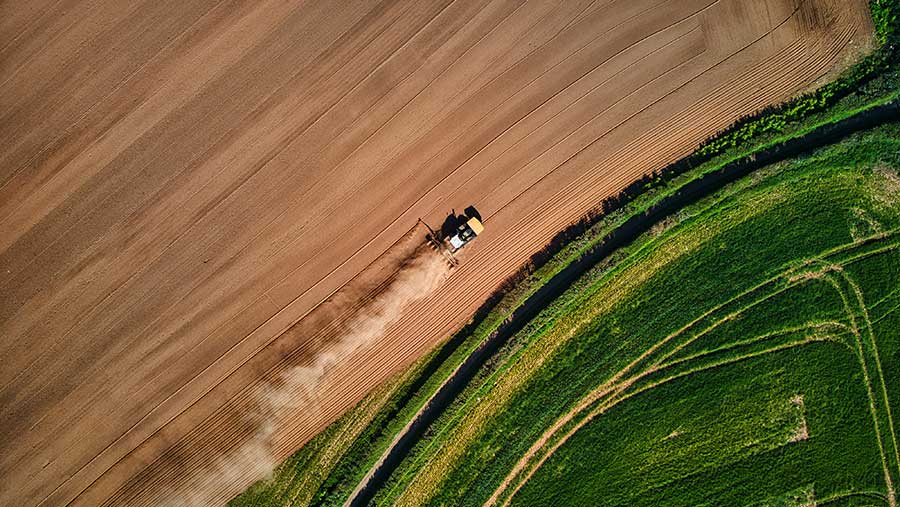Advertiser content
Change in farming: putting people at its heart
 © Photo credit - @redzeppelinon
© Photo credit - @redzeppelinon In April, in what will be my first public talk since joining Harper Adams University as Elizabeth Creak Chair in Sustainable Agri-Food Systems, I am going to be reflecting on the idea of change in farming.

David Christian Rose
Change is something that all farmers reading this have to consider on a daily basis, adapting in the short- and long-term to various challenges, including weather, disease, and policy change.
Farm businesses don’t survive through generations without change.
Though I am writing as an academic based at an institution at the heart of sustainable agri-food transitions, shaped by our students and partners, I acknowledge that I am in a privileged position sat writing this away from the corn field.
In England, Defra’s Farmer Opinion Tracker has many questions about change, asked in the context of policy changes post-Brexit.
In the latest October 2023 statistics (1357 responses), 81% of farmers say that they currently are making, or will need to make, changes to their business in the next 3-5 years.
51% of farmers say they have all or most of the information needed to inform business planning and 56% say that they are, or are somewhat, confident about their ability to make change.
Change has many facets. Firstly, there needs to be a recognition that change is needed. This realisation can come from many places, including from farm businesses themselves, from actors across the supply chain, and government.
Across the UK and Europe in recent times, tensions have risen partially as a consequence of some farmers feeling that they are not in the driving seat of change.
Rather, they feel that they are in the backseat of the car, unable to change the direction of travel that is being set by retailers, government, and others.
‘Just’ transition
This is where the idea of a ‘just’ or fair agricultural transition is needed, as well as a greater ability to hold nuanced discussions in an ever polarised world dominated by brief social media exchanges.
On the one hand, I would agree with some critics who feel that farmers are being unfairly blamed for their role in the environmental crises (e.g. water pollution, climate change, biodiversity loss) that are driving policy change.
But, on the other hand, it is also inescapably true that farming practices, albeit those designed to put food on the table for everyone, are making a contribution to the same crises.
For other reasons, including labour shortages and demographics, farming needs to change. The goal of net zero and more sustainable agri-food systems is not the problem and should not be the target for dissent.
However, the mechanisms through which to achieve the goal of greater sustainability is where more debate is needed.
This brings me back to the idea of a ‘just’ transition, spoken about by organisations including the Food, Farming, and Countryside Commission.
A just agricultural transition considers who is most likely to win and lose from changes in farming, as well as who is included in deciding what changes to make.
Recognising that some farmers find it more difficult to have their voices heard than others, as well as identifying those who are least able to adapt their farm businesses for various reasons (e.g. finances, succession, skills etc.), is a crucial starting point.
Then, steps can be taken to give the most help to those least able to make changes.
Just because change is disruptive and some people lose out doesn’t mean that change isn’t the right thing to do, but the ‘how’ of doing so is important.
Closing coal mines did need to happen to save the planet, but mining communities did not have to be left behind.
In recognising that change is needed and some need more help than others, it’s worth considering how support for farmers can best be offered.
I recently spent three months at Cornell University in New York State working with an organisation called NY FarmNet.
Some readers may have seen this organisation featured in a powerful documentary on mental health in farming called ‘MuckVille’.
Integrated support
NY FarmNet has provided support to struggling farm businesses in New York State since 1986.
Initially, support was only provided by business advisers trained in financial consultancy and knowledgeable about farming. It was realised very quickly, however, that this model of support was insufficient.
Financial consultants reported that when they visited farms to help farmers and their families plan for change, problems were encountered for which they were not trained – including inter-generational family conflict, relationship problems, lack of succession, poor physical and mental health.
These issues sometimes prevented a farm business from being able to agree on the way forward.
This problem was overcome by changing the support model.
Now, when a struggling farming business gets in touch with NY FarmNet staff, farmers can receive integrated support from business and social consultants who work together.
Often, two supporters visit the farm together, one with the skills needed to help farmers navigate business problems, and one equipped to help address any social challenges making those problems more difficult to solve.
Starting from where each farmer is, problems are addressed with the ultimate goal of putting the business in a position to make positive changes for the future.
This could be to adapt the farm business, exit farming in a dignified way, and everything in between.
Watching this model of integrated business and social support in action made me question how we have gone about helping farmers to change post-Brexit back at home.
In England, for example, the Future Farming Resilience Fund gave millions of pounds to organisations to provide free support for farmers on how to change their business.
Whilst we know that mental health is a major challenge in the farming industry, with perhaps a third in England and Wales showing signs of depression, and mental health being part of Defra’s desired resilience fund outcomes, I am yet to find much evidence of the funds being used to help supporters with mental health expertise – for example our fantastic farming mental health charities.
Undoubtedly many farmers will have benefited in some way from the free business support, but an improved financial situation does not guarantee improved mental health.
Also, poor mental health might be the reason why the business fails to get the most value from the free business support received.
As farmers need ever-more support to navigate a constantly changing set of societal and policy demands, I hope steps are taken to place support for people at the very heart.
Pilot project
With a group focused in the Staffordshire region, convened by Innovation for Agriculture and with attendance from Kingshay, Staffordshire County Council, LLM Vets, and FCN, we have been making plans for a pilot project focused on integrated advice.
Our proposed project sees good mental health and good animal welfare as intertwined.
If funded, we hope to be able to support a small number of livestock farmers in the region with a NY FarmNet-style system of integrated advice, with veterinarians working alongside mental health supporters, to change farm businesses for enhanced animal welfare.
Then, ultimately show the value of this to those policy-makers who must help farmers adapt to change.
This brings me back to my point about change having many facets. Change does not happen without a vision for the future, preferably shaped by those most affected, and without providing most support for those least able to adapt.
Change does not happen without the research-, industry-, and farmer-led innovation needed to identify evidence-based solutions.
Change does not happen without the right incentives working together to make change as easy as possible. But, change certainly does not happen if we don’t look after the people making the change.

Attend my lecture
You can attend my Welcome Lecture ‘Sustainable and just agri-food transitions: building the capacity for change’ at Harper Adams (Weston Lecture Theatre) at Noon on Monday 15th April.
Register here for attendance in-person or on the online stream.
Provided by
The School of Sustainable Food and Farming enables farmers to understand how to produce food sustainably, expanding industry knowledge on the environment, animal welfare, positive farming relationships and skills at the heart of producing nutritious, tasty, British food.
